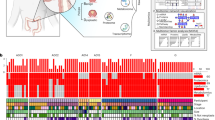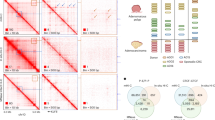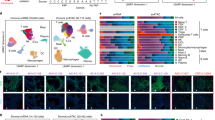Abstract
Desmoids are poorly-understood, locally aggressive, non-metastasizing fibromatoses that occur with disproportionate frequency in patients with familial adenomatous polyposis (FAP). Their nature is controversial with arguments for and against a neoplastic origin. Neoplastic proliferations are by definition monoclonal, whereas reactive processes originate from a polyclonal background. We examined clonality of 25 samples of desmoid tissue from 11 female FAP patients by assessing patterns of X-chromosome inactivation to calculate a clonality ratio. Polymerase chain reaction (PCR) amplification of a polymorphic CAG short tandem repeat (STR) sequence adjacent to a methylation-sensitive restriction enzyme site within the human androgen receptor (HUMARA) gene using fluorescent-labelled primers enabled analysis of PCR products by Applied Biosystems Genescan IITMsoftware. Twenty-one samples from nine patients were informative for the assay. Samples from all informative cases comprised a median of 66% (range 0–75%) clonal cells but from the six patients with a clonality ratio ≤0.5 comprised a median of 71% (65–75%) clonal cells. FAP-associated desmoid tumours are true neoplasms. This may have implications in the development of improved treatment protocols for patients with these aggressive tumours. © 2000 Cancer Research Campaign
Similar content being viewed by others
Article PDF
Change history
16 November 2011
This paper was modified 12 months after initial publication to switch to Creative Commons licence terms, as noted at publication
References
Allen RC, Zoghbi HY, Moseley AB, Rosenblatt HM and Belmont JW (1992) Methylation of HpaII and HhaI sites near the polymorphic CAG repeat in the human androgen-receptor gene corresponds with X-chromosome inactivation. Am J Hum Genet 51: 1229–1239
Alman BA, Pajerski ME, Diaz-Cano S, Corboy K and Wolfe HJ (1997) Aggressive fibromatosis (desmoid tumour) is a monoclonal disorder. Diagn Mol Pathol 6: 98–101
Belchetz LA, Berk T, Bapat B, Cohen Z and Gallinger S (1996) Changing causes of mortality in patients with FAP. Dis Colon Rectum 39: 384–387
Brooks MD, Ebbs SR, Colletta AA and Baum M (1992) Desmoid tumours treated with triphenylethylenes. Eur J Cancer 28A: 1014–1018
Church JM (1994) Desmoid tumours in familial adenomatous polyposis. Surg Oncol Clin N Am 3: 435–447
Church JM (1995) Desmoid tumours in patients with familial adenomatous polyposis. Semin Colon Rectal Surg 6: 29–32
Clark SK, Johnson Smith TGP, Katz DE, Reznek RH and Phillips RKS (1998) Identification and progression of a desmoid precursor lesion in patients with familial adenomatous polyposis. Br J Surg 85: 970–973
Dal Cin P, Sciot R, Aly MS, Delabie J, Stas M, De Wever I, Van Damme B and Van den Berghe H (1994) Some desmoid tumors are characterized by trisomy 8. Genes Chromosomes Cancer 10: 131–135
Dal Cin P, Sciot R, Van Damme B, De Wever I and Van den Berghe H (1995) Trisomy 20 characterizes a second group of desmoid tumors. Cancer Genet Cytogenet 79: 189
Delabesse E, Aral S, Kamoun P, Varet B and Turhan AG (1995) Quantitative non-radioactive clonality analysis of human leukemic cells and progenitors using the human androgen receptor (AR) gene. Leukemia 9: 1578–1582
Delabesse E, Oksenhendler E, Lebbe C, Verola O, Varet B and Turhan AG (1997) Molecular analysis of clonality in Kaposi’s sarcoma. J Clin Pathol 50: 664–668
El Kassar N, Hetet G, Briere J and Grandchamp B (1998) X-chromosome inactivation in healthy females: incidence of excessive lyonisation with age and comparison of assays involving DNA methylation and transcript polymorphisms. Clin Chem 44: 61–67
Fey MF, Peter HJ, Hinds HL, Zimmermann A, Liechti-Gallati S, Gerber H, Studer H and Tobler A (1992) Clonal analysis of human tumors with M27 beta, a highly informative polymorphic X chromosomal probe. J Clin Invest 89: 1438–1444
Fialkow PJ, Gartler SM and Yoshida A (1967) Clonal origin of chronic myelocytic leukaemia in man. Proc Natl Acad Sci USA 58: 1468–1471
Goellner ER and Soule EH (1980) Desmoid tumours. An ultrastructural study of eight cases. Hum Pathol 11: 43–50
Gurbuz AK, Giardiello FM, Petersen GM, Krush AJ, Offerhaus GJ, Booker SV, Kerr MC and Hamilton SR (1994) Desmoid tumours in familial adenomatous polyposis. Gut 35: 377–381
Hamilton L, Blackstein M, Berk T, McLeod RS, Gallinger S, Madlensky L and Cohen Z (1996) Chemotherapy for desmoid tumours in association with familial adenomatous polyposis: a report of three cases. Can J Surg 39: 247–252
Hayry P, Reitamo JJ, Totterman S, Hopfner-Hallikainen D and Sivula A (1982) The desmoid tumor. II. Analysis of factors possibly contributing to the etiology and growth behavior. Am J Clin Pathol 77: 674–680
Hunt RTN, Morgan HC and Ackerman LV (1960) Principles in the management of extra-abdominal desmoids. Cancer 13: 825
Kiel KD and Suit HD (1984) Radiation therapy in the treatment of aggressive fibromatoses (desmoid tumors). Cancer 54: 2051–2055
Knudson AGJ (1985) Hereditary cancer, oncogenes and anti-oncogenes. Cancer Res 45: 1437–1443
Li C, Bapat B and Alman BA (1998) Adenomatous polyposis coli gene mutation alters proliferation through its beta-catenin-regulatory function in aggressive fibromatosis (desmoid tumour). Am J Pathol 153: 709–714
Li M, Cordon-Cardo C, Gerald WL and Rosai J (1996) Desmoid fibromatosis is a clonal process. Hum Pathol 27: 939–943
Lotfi AM, Dozois RR, Gordon H, Hruska LS, Weiland LH, Carryer PW and Hurt RD (1989) Mesenteric fibromatosis complicating familial adenomatous polyposis: predisposing factors and results of treatment. Int J Colorectal Dis 4: 30–36
Lucas DR, Shroyer KR, McCarthy PJ, Markham NE, Fujita M and Enomoto TE (1997) Desmoid tumor is a clonal cellular proliferation: PCR amplification of HUMARA for analysis of patterns of X-chromosome inactivation. Am J Surg Pathol 21: 306–311
Lynch HT, Fitzgibbons R, Jr Chong S, Cavalieri J, Lynch J, Wallace F and Patel S (1994) Use of doxorubicin and dacarbazine for the management of unresectable intra-abdominal desmoid tumors in Gardner's syndrome. Dis Colon Rectum 37: 260–267
Lyon MF (1972) X-chromosome inactivation and developmental patterns in mammals. Biol Rev Camb Philos Soc 47: 1–35
Miyaki M, Konishi M, Kikuchi-Yanoshita R, Enomoto M, Tanaka K, Takahashi H, Muraoka M, Mori T, Konishi F and Iwama T (1993) Coexistence of somatic and germ-line mutations of APC gene in desmoid tumors from patients with familial adenomatous polyposis. Cancer Res 53: 5079–5082
Mutter GL and Boynton KA (1995) PCR bias in amplification of androgen receptor alleles, a trinucleotide repeat marker used in clonality studies. Nucleic Acids Res 23: 1411–1418
Nugent KP, Spigelman AD and Phillips RKS (1993) Life expectancy after colectomy and ileorectal anastomosis for familial adenomatous polyposis. Dis Colon Rectum 36: 1059–1062
Palmirotta R, Curia MC, Esposito DL, Valanzano R, Messerini L, Ficari F, Brandi ML, Tonelli F, Mariani-Costantini R and Battista P (1995) Novel mutations and inactivation of both alleles of the APC gene in desmoid tumors. Hum Mol Genet 4: 1979–1981
Pfeffer L, Lipkin M, Stutman O and Kopelovich L (1976) Growth abnormalities of cultured human skin fibroblasts derived from individuals with hereditary adenomatosis of the colon and rectum. J Cell Physiol 89: 29–37
Reitamo JJ, Hayry P, Nykyri E and Saxen E (1982) The desmoid tumor. I. Incidence, sex-, age- and anatomical distribution in the Finnish population. Am J Clin Pathol 77: 665–673
Reitamo JJ, Scheinin TM and Hayry P (1986) The desmoid syndrome. New aspects in the cause, pathogenesis and treatment of the desmoid tumor. Am J Surg 151: 230–237
Rodriguez-Bigas MA, Mahoney MC, Karakousis CP and Petrelli NJ (1994) Desmoid tumors in patients with familial adenomatous polyposis. Cancer 74: 1270–1274
Scates DK, Clark SK, Phillips RKS and Venitt S (1998) Lack of telomerase in desmoids occurring sporadically and in association with familial adenomatous polyposis. Br J Surg 85: 965–969
Soule EH and Scanlon PW (1962) Fibrosarcoma arising in an extra-abdominal desmoid; report of a case. Mayo Clin Proc 37: 433–451
Stout AP (1951) The fibromatoses and fibrosarcoma. Bull Hospital Joint Dis 12: 126–130
Tonon L, Bergamaschi G, Dellavecchia C, Rosti V, Lucotti C, Malabarba L, Novella A, Vercesi E, Frassoni F and Cazzola M (1998) Unbalanced X-chromosome inactivation in haemopoietic cells from normal women. Br J Haematol 102: 996–1003
Tsukada K, Church JM, Jagelman DG, Fazio VW, McGannon E, George CR, Schroeder T, Lavery I and Oakley J (1992) Noncytotoxic drug therapy for intra-abdominal desmoid tumor in patients with familial adenomatous polyposis. Dis Colon Rectum 35: 29–33
Vogelstein B and Kinzler K (1993) The multistep nature of cancer. Trends Genet 9: 138
Vogelstein B, Fearon ER, Hamilton SR, Preisinger AC, Willard HF, Michelson AM, Riggs AD and Orkin SH (1987) Clonal analysis using recombinant DNA probes from the X-chromosome. Cancer Res 47: 4806–4813
Wainscoat JS and Fey MF (1990) Assessment of clonality in human tumors: a review. Cancer Res 50: 1355–1360
Willman CL, Busque L, Griffith BB, Favara BE, McClain KL, Duncan MH and Gilliland DG (1994) Langerhans’-cell histiocytosis (Histiocytosis X) – a clonal proliferative disease. N Engl J Med 331: 154–160
Author information
Authors and Affiliations
Rights and permissions
From twelve months after its original publication, this work is licensed under the Creative Commons Attribution-NonCommercial-Share Alike 3.0 Unported License. To view a copy of this license, visit http://creativecommons.org/licenses/by-nc-sa/3.0/
About this article
Cite this article
Middleton, S., Frayling, I. & Phillips, R. Desmoids in familial adenomatous polyposis are monoclonal proliferations. Br J Cancer 82, 827–832 (2000). https://doi.org/10.1054/bjoc.1999.1007
Received:
Revised:
Accepted:
Published:
Issue date:
DOI: https://doi.org/10.1054/bjoc.1999.1007
Keywords
This article is cited by
-
Mesenteric fibromatosis
International Journal of Colorectal Disease (2014)
-
Melanoma: A model for testing new agents in combination therapies
Journal of Translational Medicine (2010)
-
Response of imatinib-resistant extra-abdominal aggressive fibromatosis to sunitinib: case report and review of the literature on response to tyrosine kinase inhibitors
Cancer Chemotherapy and Pharmacology (2009)
-
A Web-Based Data Warehouse on Gene Expression in Human Malignant Melanoma
Journal of Investigative Dermatology (2007)
-
Mesenteric Desmoid Tumors in Singapore Familial Adenomatous Polyposis Patients: Clinical Course and Genetic Profile in a Predominantly Chinese Population
Diseases of the Colon & Rectum (2007)



